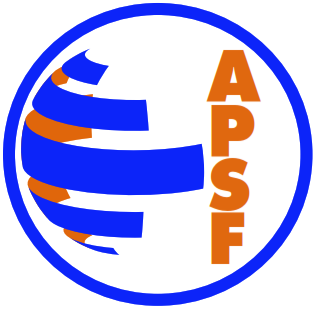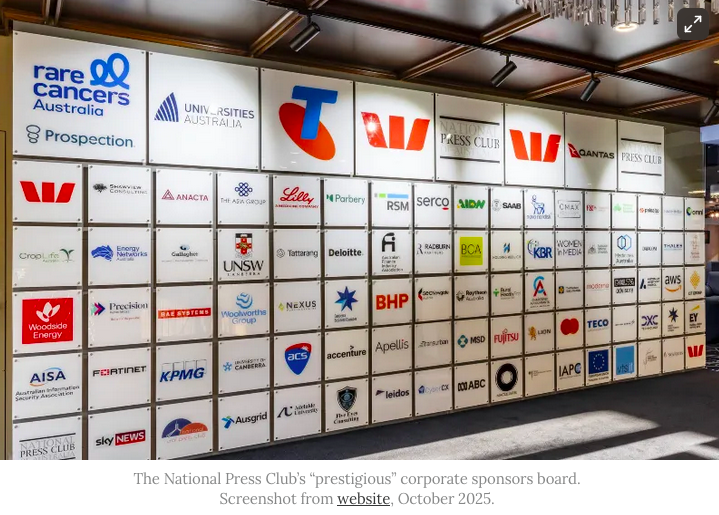The National Press Club of Australia lists 81 corporate sponsors on its website.
Twenty-one of them (listed below) are either part of the global arms industry or actively working on its behalf.
Ten are multinational weapons manufacturers or military services corporations. They include the world’s two biggest weapons makers, Lockheed Martin and Raytheon (RTX); British giant BAE Systems; France’s largest weapons-maker, Thales; and US weapons corporation Leidos – all five are in the global top 20. BAE Systems, which is the largest contractor to the Department of Defence, received $2 billion from Australian taxpayers last year.
In 2023, these five corporations alone were responsible for almost a quarter – 23.8 per cent (US$150.4 billion (A$231.5 billion)) – of total weapons sales (US$632 billion (A$973 billion)) made by the world’s top 100 weapons companies that year.
Last year, UN experts named Lockheed Martin, BAE Systems, RTX (Raytheon) and eight other multinationals in a statement, warning them that they risked being found in violation of international law for their continued supply of weapons, parts, components and ammunition to Israeli forces. The experts called on the corporations to immediately end weapons transfers to Israel. None has done so.
Another of the Club’s sponsors – Thales – is being investigated by four countries for widespread criminal activity in three separate corruption probes. In a fourth, long-running corruption case in South Africa, the country’s former president, Jacob Zuma, is now in court, alongside Thales, being tried on 16 charges of racketeering, fraud, corruption and money laundering in connection with arms deals his government did with Thales.
Global expert Andrew Feinstein has documented his extensive research into the arms industry. He told Undue Influence that wherever the arms trade operates, it “increases corruption and undermines democracy, good governance, transparency, and the rule of law, while, ironically, making us less safe”.
Undue Influence asked the Press Club’s CEO, Maurice Reilly, what written policies or guidelines were in place that addressed the suitability and selection of corporations proposing to become Press Club sponsors.
Mr Reilly responded: “The board are informed monthly about…proposals and have the right to refuse any application.”
Wherever the arms trade operates it “increases corruption and undermines democracy, good governance, transparency, and the rule of law,
while, ironically, making us less safe”.
– Andrew Feinstein, author of Shadow World: Inside the Global Arms Trade
National Press Club board
The National Press Club, established by journalists in 1963, is an iconic Australian institution. It is best known for its weekly luncheon addresses, televised on the ABC, covering issues of national importance, after which the speaker is questioned by journalists.
The Club’s board has 10 directors led by Tom Connell, political host and reporter at Sky News, who was elected president in February following the resignation of the ABC’s Laura Tingle.
The other board members are: vice president Misha Schubert (CEO, Super Members Council of Australia; formerly with The Age and The Australian); treasurer Greg Jennett (ABC); Steve Lewis (senior adviser, SEC Newgate; formerly with NewsCorp and the Financial Review); Jane Norman (ABC); Anna Henderson (SBS); Julie Hare (Financial Review); Andrew Probyn (Nine Network); Gemma Daley (Media & Government Affairs, Ai Group); and Corrie McLeod, the sole representative from an independent media outlet – InnovationAus.
At least two board members have jobs that involve lobbying.
Long-term board member Steve Lewis works as a senior adviser for lobbying firm SEC Newgate, which itself is a Press Club sponsor and also has as clients the Press Club’s two largest sponsors: Westpac and Telstra. SEC Newgate has previously acted for several Press Club sponsors, including Serco (one of the arms industry multinationals listed below), BHP, Macquarie Bank, Tattarang, and Spirits & Cocktails Australia Inc.
Gemma Daley joined the board a year ago, having started with Ai Group as its head of media and government affairs four months earlier. Ms Daley had worked for Nationals’ leader David Littleproud, former prime minister Malcolm Turnbull and former treasurer Joe Hockey and, before that, for media outlets the Financial Review and Bloomberg. Ai Group has a significant defence focus and promotes itself as “the peak national representative body for the Australian defence industry”. The group has established a Defence Council and in 2017 appointed a former assistant secretary of the Defence Department, Kate Louis, to lead it. The co-chairs of its Defence Council are senior arms industry executives. One of them, Paul Chase, is CEO of Leidos Australia, a Press Club sponsor.
Undue Influence asked Ms Daley for comment on several aspects related to her position on the board, including whether she has had to declare any conflicts of interest to date. She responded: “Thanks for the inquiry. I have forwarded this through to Maurice Reilly. Have a good day.”
Given the potential for conflicts of interest to arise, as happens on any board, Undue Influence had already asked the Press Club CEO what written policies or guidelines existed to ensure the appropriate management of conflicts of interest by board members and staff.
Mr Reilly responded:
The Club has a directors’ conflict register which is updated when required. Each meeting, board members and management are asked if they have conflicts of interest with the meeting agenda. We have a standard corporate practice that where a director has a conflict on an agenda item they excuse themselves from the meeting and take no [part] in any discussion or any decision.
Undue Influence is neither alleging nor implying inappropriate or illegal behaviour by anyone named in this article. Our objective, as always, is to shine a light on, and scrutinise, the weapons industry’s opaque engagement in public life in Australia.
Selling “access”
While Mr Reilly declined to disclose the Club’s sponsorship arrangements with Westpac and Telstra, citing “commercial in confidence” reasons, The Sydney Morning Herald reported earlier this year that Westpac paid $3 million in 2015 to replace NAB as the Press Club’s principal sponsor.
The SMH article, “Westpac centre stage at post-budget bash”, on Treasurer Jim Chalmers’ National Press Club address in the Great Hall of Parliament House in late March, added:
[Westpac] … gets more than its money’s worth in terms of access. New-ish chief executive Anthony Miller got the most coveted seat in the house, between Chalmers and Prime Minister Anthony Albanese… Finance Minister Katy Gallagher and Deputy Prime Minister Richard Marles were also on the front tables.
Westpac occupied prime real estate in the Great Hall, with guests on its tables including Treasury Secretary Steven Kennedy, Department of Prime Minister and Cabinet boss Glyn Davis, Attorney-General Mark Dreyfus, Housing Minister Clare O’Neil and Labor national secretary and campaign mastermind Paul Erickson…
Communications Minister Michelle Rowland was on the Telstra table.
Mr Reilly told Undue Influence that all the other corporate sponsors pay $25,000 per year, with a few paying extra as partners in the Club’s journalism awards.
The 21 arms industry and related sponsors therefore contribute an annual $525,000 to the Press Club’s coffers. This is 23% of the $2.26 million revenue it earns from “membership, sponsorship and broadcasting”, the Club’s largest revenue line, as shown in its 2024 financial statement.
“The National Press Club of Australia proudly partners with organisations that share our commitment to quality, independent journalism,” says the Club’s website.
“Aligning your brand with the National Press Club is an opportunity for unparalleled engagement in the Australian political debate and announces that your organisation is part of the business culture in Canberra.”
In response to Undue Influence’s questions about the Club’s cancellation of a planned address by the internationally acclaimed journalist Chris Hedges (covered below), Mr Reilly stated that: “For the avoidance of doubt [sponsors] do not receive any rights to speak at the club [nor are they] able to influence decisions on speakers.”
Sponsors may not be granted a right to speak, but they are sometimes invited to speak, with their status as sponsors not always disclosed to audiences.
When the Club’s second largest sponsor, Telstra, spoke on 10 September, both Club president Tom Connell and Telstra CEO Vicki Brady noted the corporation’s longstanding sponsorship.
Compare this with two addresses given by $25,000 corporate sponsors – Kurt Campbell (former US deputy secretary of state, now co-founder and chair of The Asia Group) who gave an address on 7 September; and Mike Johnson, CEO of Australian Industry and Defence Network (AIDN), who gave an address on 15 October. Neither the Press Club nor the speakers disclosed the companies’ sponsorship of the Press Club.
While both speakers are considered experts in their field, the sponsorships should have been disclosed as a matter of public accountability.
“Priority seating and brand positioning”
On its website, the Club also promotes additional benefits of corporate sponsorship, including, “Brand association with inclusion on our prestigious ‘Corporate Partners’ board and recognition on the National Press Club of Australia website”.
The Club also promises corporate sponsors that they will receive “priority seating and brand positioning” at its weekly luncheon addresses, as the following examples show. (As principal sponsor, the logo of Westpac appears on every table and on the podium.)
The local subsidiary of British giant BAE Systems has benefited handsomely from its modest $25,000 annual sponsorship. It had the best table – behind the microphone from which journalists asked questions – at then defence minister Peter Dutton’s address in November 2021. The BAE logo appeared on the national public broadcaster – which has strict rules against advertising – eight times during the half-hour question period following Mr Dutton’s address, giving BAE Systems extended ‘brand positioning’ with its target market: senior politicians, defence public servants and military officers.
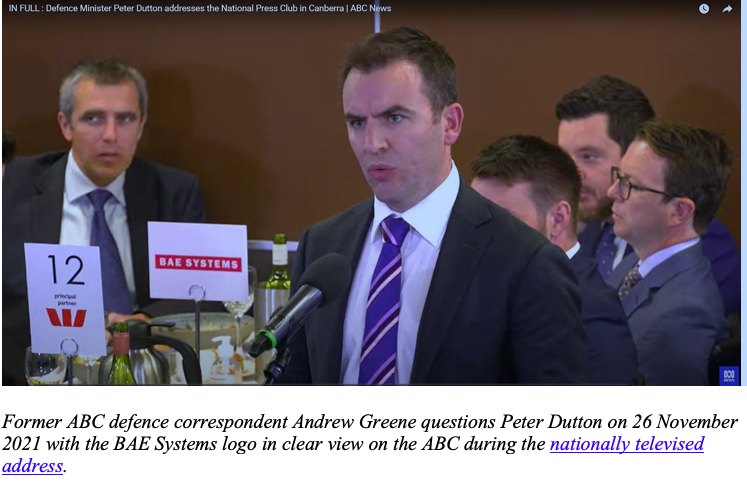
On 28 November 2023, Minister for Defence Industry Pat Conroy spoke about AUKUS. The logos of Press Club sponsors DXC Technology and Deloitte were also well-situated for the camera during question time. Both companies are significant contractors to the Defence Department. Deloitte also works for the weapons industry, including BAE Systems.
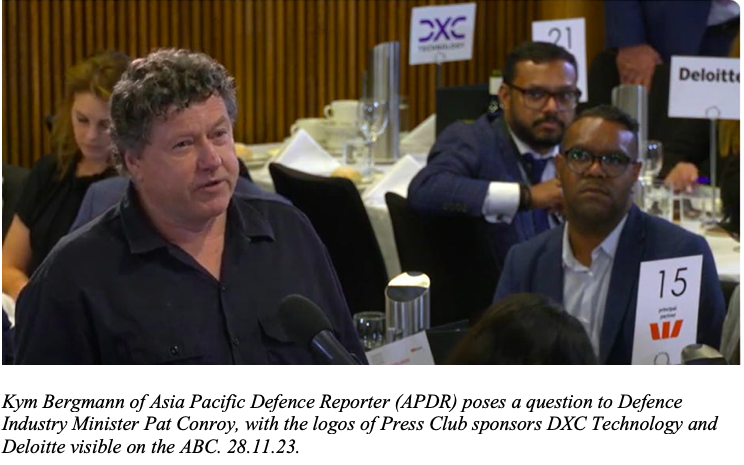
The Press Club recently drew significant attention to itself after it cancelled a planned address by the Pulitzer-prize-winning American journalist, and former long-term war correspondent, Chris Hedges. Mr Hedges reported for The New York Times for 15 years, from 1990-2005, including long stints as its bureau chief in the Middle East and in the Balkans. He was to have appeared at the Press Club on 20 October.
However, in late September, Press Club CEO Maurice Reilly cancelled Mr Hedges’ appearance. This occurred two weeks after the Club was sent details of what Mr Hedges proposed to cover, including a link to an article he had entitled The Betrayal of Palestinian Journalists. In that article, Mr Hedges wrote:
Israel has murdered 245 journalists in Gaza by one count and more than 273 by another… No war I covered comes close to these numbers of dead. Since Oct 7 [2023], Israel has killed more journalists “than the US Civil War, World Wars I and II, the Korean War, the Vietnam War (including the conflicts in Cambodia and Laos), the wars in Yugoslavia in the 1990s and 2000s, and the post-9/11 war in Afghanistan, combined”.
Mr Hedges also intended to cover what he has described as the “barrage of Israeli lies amplified and given credibility by the Western press”, examples of which he provides in the above article.

Chris Hedges later delivered the 30 minute speech, at a different venue.
Following a scathing post from Mr Hedges about the Press Club’s cancellation of his address, and significant public disquiet, the Press Club issued a statement denying it had come under external pressure to cancel his address. Inexplicably, the Press Club also denied it had confirmed the Hedges address. This claim was easily checked and soon reported to be false. Undue Influence has seen the emails showing that the Press Club had confirmed the address.
Numerous members of the public posted their concerns on the Press Club’s Facebook page. Here are three examples:
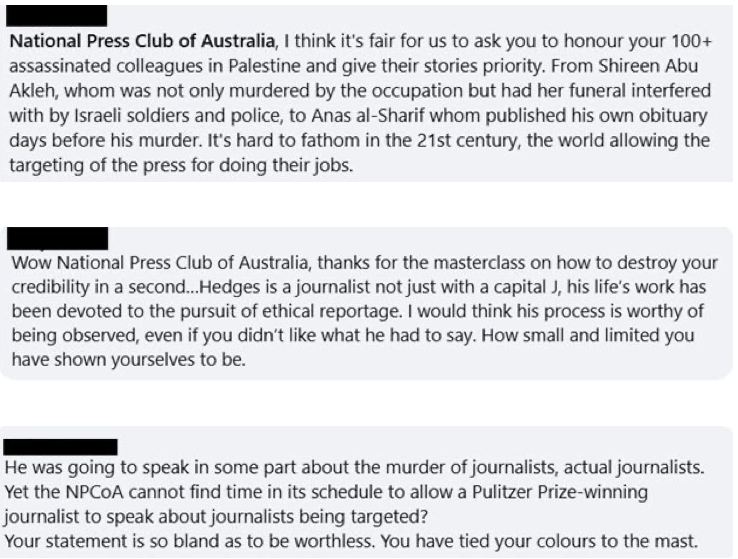
National Press Club funded by companies profiting from genocide
In July, Francesca Albanese, UN Special Rapporteur on the situation of human rights in the Palestinian territories, issued a report explaining how the corporate sector had become complicit with the State of Israel in conducting the genocide.
Ms Albanese highlighted Lockheed Martin and the F-35 program, which has 1,650 companies world-wide in its supply chain. More than 75 of those companies are Australian.
Her report also noted that arms-making multinationals depend on legal, auditing and consulting firms to facilitate export and import transactions to supply Israel with weapons.
Four of the world’s largest accounting, audit and consulting firms – all of which have arms industry corporations as clients – are sponsors of the Press Club: KPMG, Accenture, Deloitte and EY. Until recently, PwC counted among them.
EY (Ernst & Young) has been Lockheed Martin’s auditor since 1994. EY is also one of two auditors used by Thales, and has been for 22 years. Deloitte has been BAE Systems’ auditor since 2018. PricewaterhouseCoopers (PwC) – a Press Club sponsor until 2024 – has been Raytheon’s auditor since 1947.
Lockheed Martin’s supply to Israel of F-16 and F-35 fighter jets and C-130 Hercules transport planes, and their parts and components, along with Hellfire missiles and other munitions, has directly facilitated Israel’s genocide.
Raytheon’s (RTX) supply of guided missiles, bombs, and other advanced weaponry and defence systems, like the Iron Dome interceptors, also directly supports Israel military capability.
In England, BAE Systems builds the rear fuselage of every F-35, with the horizontal and vertical tails and other crucial components manufactured in its UK and Australian facilities. It also supplies the Israeli military with munitions, missile launching kits and armoured vehicles, while BAE technologies are integrated into Israel’s drones and warships.
Thales supplies Israel’s military with vital components, including drone transponders. Australian Zomi Frankcom and her World Central Kitchen colleagues were murdered by an Israeli Hermes drone, which contain Thales’ transponders. Yet, echoing Australia, France claims its military exports to Israel are non-lethal.
National Press Club sponsors from military-industrial complex
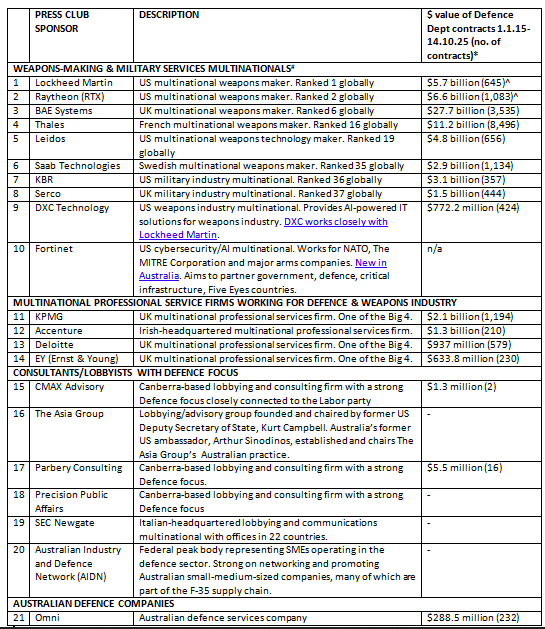
* Source: Department of Finance, Austender records online
# Rankings compiled by SIPRI at December 2023 (published December 2024)
^ NOTE ON US COMPANIES: The Defence Department procures weapons/military goods directly from Lockheed Martin, RTX (Raytheon) and other US corporations via the US Government’s Foreign Military Sales program. The value of FMS contracts is not included in the table.
Note on the use of the word ‘genocide’
Three independent experts appointed by the UN’s Human Rights Commission – the Commission of Inquiry on the Occupied Palestinian Territory and Israel – issued a report in September that concluded Israel is committing genocide in Gaza. One of the Commissioners – Chris Sidoti – speaking at the Press Club recently, said the Commission’s report will remain the most authoritative statement on this issue until the world’s highest authority, the International Court of Justice, makes its ruling.
